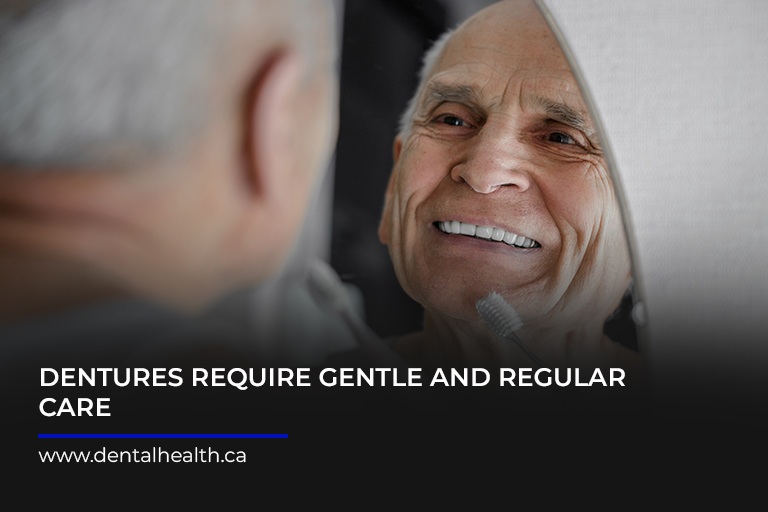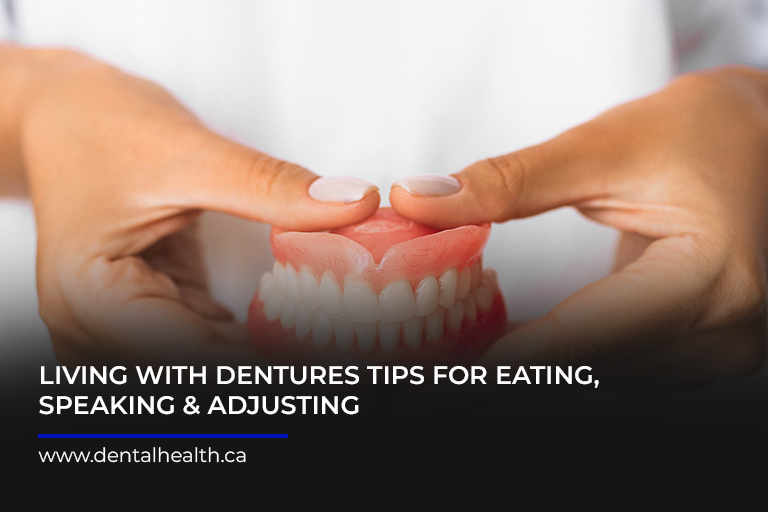Dentures are removable appliances that replace missing teeth and surrounding tissues. They can improve your appearance, oral health, and overall quality of life. Adapting to dentures requires time and patience. You will encounter challenges as you learn to eat, speak, and adjust to the sensation of wearing dentures.
Proper care and maintenance are essential for the longevity of your dentures and your oral health. With commitment and a positive attitude, you can successfully navigate the transition to wearing dentures and enjoy a fulfilling life.
Benefits of Dentures
Dentures offer numerous advantages that can significantly improve your well-being. Here are some key benefits:
- Enhanced Appearance: Dentures can restore your smile and facial structure, giving you a more youthful and confident appearance. Missing teeth can cause the cheeks and lips to sag, making you look older. Dentures support these facial muscles, restoring a fuller, more natural look.
- Improved Chewing Ability: Dentures allow you to chew food more effectively, making it easier to maintain a balanced diet. This can improve digestion and overall nutrition, which is vital for maintaining good health.
- Clearer Speech: Replacing missing teeth with dentures can improve pronunciation and clarity of speech. Missing teeth can affect your ability to form certain sounds. Dentures help to fill the gaps, allowing for clearer articulation.
- Boosted Self-Esteem: Feeling good about your smile can positively impact your self-confidence and social interactions. Dentures can help you feel more comfortable and confident in social situations, leading to a more active and fulfilling social life.
- Improved Oral Health: Dentures can help prevent the remaining natural teeth from shifting and becoming misaligned. This helps to maintain the integrity of your jawbone and prevent further tooth loss.
- Support for Facial Muscles: Dentures provide support for your facial muscles, preventing a sunken or collapsed appearance. This can help you maintain a more youthful appearance and improve your self-esteem.
- Cost-Effective Solution: Dentures offer a relatively affordable option for replacing missing teeth compared to other tooth replacement methods like implants. They are a viable solution for individuals seeking to restore their smile and oral function.
Eating with Dentures

Learning to eat with dentures takes practice. Start with soft foods and gradually introduce harder textures as you become more comfortable.
- Start Soft: Begin with soft foods cut into small pieces. Foods like mashed potatoes, yogurt, and cooked vegetables are good choices initially. Gradually reintroduce other foods as you become more accustomed to your dentures.
- Chew Evenly: Distribute food evenly on both sides of your mouth to maintain stability and prevent your dentures from rocking. This balanced chewing helps to distribute the pressure evenly, reducing the risk of discomfort or dislodgement.
- Take Small Bites: Cut food into smaller pieces and take smaller bites to make chewing easier and prevent overloading your dentures. Avoid biting directly into hard foods like apples or raw carrots.
- Use Denture Adhesive: Denture adhesives can provide additional stability and prevent slippage while eating. Apply adhesive as directed by the manufacturer. There are various types of denture adhesives available, so consult with your denturist to determine the best option for you.
- Stay Hydrated: Drink plenty of water throughout the day to help with saliva production and aid in swallowing. Saliva helps to lubricate your mouth and create a seal between your dentures and gums, improving suction and stability.
- Avoid Sticky Foods: Sticky foods like caramel and chewing gum can dislodge your dentures. Choose foods that are easier to chew and swallow.
- Practice Patience: It may take time to adjust to eating with dentures. Be patient and persistent, and you will gradually regain your ability to enjoy a variety of foods.
- Cut Hard Foods: Cut hard foods like apples and carrots into bite-sized pieces or cook them to soften their texture. This will make them easier to chew and reduce the risk of denture dislodgement.
- Be Mindful of Temperature: Allow hot foods and beverages to cool slightly before consuming them to avoid burning your mouth. Dentures can affect your perception of temperature, so it’s important to be cautious.
Speaking with Dentures
Speaking with dentures may feel different initially. Practice speaking aloud and focus on clear enunciation.
- Practice Regularly: Read aloud, sing, and talk to yourself to get used to speaking with your dentures. This helps to train your tongue and facial muscles to adapt to the presence of dentures.
- Start Slowly: Speak slowly and deliberately, paying attention to your pronunciation. Gradually increase your speaking speed as you become more comfortable.
- Use Denture Adhesive: Adhesive can help to secure your dentures and prevent them from slipping while speaking. This can improve your confidence and clarity of speech.
- Focus on Tongue Placement: Pay attention to where your tongue rests in your mouth. It may take some time to find the optimal position for clear speech with dentures.
- Try Tongue Exercises: Simple tongue exercises can help improve your speech clarity. These exercises can strengthen your tongue muscles and improve your control over tongue movements.
- Stay Hydrated: Drinking water keeps your mouth moist and helps with pronunciation. Dry mouth can make it more difficult to speak clearly with dentures.
- Be Patient: It takes time to adjust to speaking with dentures. Don’t get discouraged if you experience some initial difficulty.
- Consult a Speech-Language Pathologist: If you experience persistent difficulties with speech, consider consulting a speech-language pathologist. They can provide personalized exercises and strategies to improve your speech clarity.
Adjusting to Dentures
Adjusting to dentures is a gradual process. Be patient with yourself and follow your denturist’s instructions.
- Expect an Adjustment Period: It takes time for your mouth to adapt to dentures. You may experience some initial soreness or discomfort, which is normal.
- Follow Your Denturist’s Instructions: Adhere to your denturist’s guidelines for wearing and caring for your dentures. They will provide specific instructions on how to break in your new dentures, clean them properly, and address any concerns you may have.
- Wear Your Dentures Regularly: Wear your dentures as much as possible, especially in the beginning, to help your mouth adjust to them. Gradually increase the wearing time to build up your tolerance.
- Manage Sore Spots: If you experience sore spots, contact your denturist for adjustments. They can make minor adjustments to relieve pressure points and improve the fit of your dentures.
- Practice Oral Hygiene: Continue to practice good dental hygiene by brushing your tongue, gums, and any natural teeth that are still intact. This helps to prevent gum disease and other oral health issues.
- Use Denture Cleanser: Clean your dentures daily with a denture cleanser to remove food particles, bacteria, and stains. Soaking your dentures overnight in a denture cleansing solution can help to keep them clean and fresh.
- Rinse Your Mouth Regularly: Rinse your mouth with water or mouthwash after eating to remove food debris and keep your breath fresh. This also helps to remove any denture adhesive residue.
- Rest Your Gums: Remove your dentures for at least six to eight hours each day, preferably at night, to allow your gums to rest. This promotes healthy gum tissue and prevents irritation.
- Attend Follow-Up Appointments: Visit your denturist for regular checkups and adjustments to ensure your dentures continue to fit properly and function optimally.
Caring for Dentures

Proper denture care is crucial for maintaining their longevity and your oral health.
- Handle with Care: Dentures are fragile and can break if dropped, so it’s crucial to handle them with care when cleaning or removing them from your mouth. Clean them over a soft towel or a sink filled with water to prevent damage if dropped.
- Clean Daily: Brush your dentures daily with a soft-bristled brush and denture cleanser is recommended to effectively remove food, plaque, and stains from your teeth. Avoid using abrasive cleaners or toothpaste, as these can scratch the denture surface.
- Soak Overnight: To maintain denture cleanliness and remove debris, soak them overnight in a denture cleansing solution or water. This helps to prevent the dentures from drying out and warping.
- Rinse Thoroughly: Rinse your dentures thoroughly under running water before placing them back in your mouth. This removes any traces of the cleaning solution and ensures freshness.
- Store Properly: When not wearing your dentures, store them in a denture bath or a container with water or denture cleansing solution to prevent them from drying out. Keep them in a safe place where they won’t be accidentally knocked over or damaged.
- Avoid Hot Water: Do not use hot water to clean or soak your dentures, as it can warp or damage them. Use lukewarm or cool water instead.
- Don’t Use Bleach: Avoid using bleach or other harsh chemicals to clean your dentures, as these can discolour and weaken the material.
- See Your Denturist Regularly: Visit your denturist for regular checkups and professional cleanings to ensure your dentures remain in good condition. They can also identify any potential issues and make necessary adjustments.
Living with dentures presents a unique set of challenges, but with the right approach and consistent care, you can successfully adapt and enjoy a fulfilling life. By following these tips for eating, speaking, and adjusting to dentures, you can regain your confidence and improve your quality of life. Remember that patience and persistence are key. Embrace the journey, and don’t hesitate to seek guidance from your denturist whenever needed. They are your partners in helping you achieve optimal oral health and well-being with your dentures.
If you have any questions or concerns about dentures or oral health, please contact Kingsway Family Dentistry at (905) 563-4001. We are here to support you on your journey to a healthy, confident smile.

